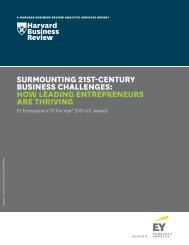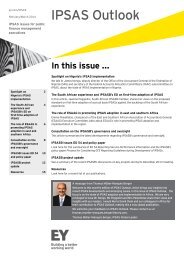Create successful ePaper yourself
Turn your PDF publications into a flip-book with our unique Google optimized e-Paper software.
It’s not all bad news, though. Internet penetration in Africa hasexperienced a dramatic increase over the past five years, doublingfrom just 10% in 2010 to nearly 20% in 2014 (ITU, 2014). Mobilebroadband is experiencing annual growth at an estimated 26 % inless developed countries (ITU, 2014). Yet despite this progress,penetration rates lag far behind the rest of the world, and it is nosurprise that between 50 and 70% of Africans cite high costs as theprimary reason they are not online (ITU, 2013).The economic benefits of broadband are wide-ranging, impactingeconomies from the local community level up to the globallevel. According to a 2010 World Bank study, a 10 % increase inbroadband penetration can accelerate economic growth in low- andmiddle-income countries by up to 1.38 %age points (World Bank,2010). The GDP of sub-Saharan Africa is currently estimated atUS $1.592 trillion (World Bank, 2013), so even relatively modestincreases in penetration rates will yield billions in economicbenefits.These benefits will accrue in diverse ways — from new onlinebusinesses being created to more efficient supply chains. InSouth Africa alone, wireless broadband and related industries areestimated to generate US $7.2 billion and create a further 28 000jobs by 2015 (Broadband Commission, 2013).Perhaps of even greater interest to many are the impacts thatincreased connectivity will deliver in areas such as health,governance, and society, dramatically changing the day-to-day livesof Africans for the better.It is estimated that e-health services, including remote diagnosis,advice, treatment and health education — all underpinned byaffordable broadband access — could address 80 % of the healthissues of patients in poorly staffed rural clinics in Africa (McKinsey,2013), and save over 1 000 000 lives in sub-Saharan Africa overthe next five years (GSMA/PwC, 2013). Such services are alreadybeing used to fill critical health care gaps, particularly in rural,conflict-affected, and poverty-stricken areas where medical centresmay be understaffed or medical personnel entirely absent.Web-driven distance education programs also offer medical andhealth training programmes, helping to expand the pool of trainedmedical personnel and enhance the quality of services they are ableto provide.A recent report took a closer look at the impact technology couldhave on governance and the delivery of public services, andestimated that more effective delivery of Africa’s public servicescould achieve technology-related productivity gains of US $10-25billion annually, by 2025. This would be achieved through measuresincluding the digitisation of public records management and theuse of enterprise resource planning. The end-to-end digitisation ofrevenue collection, including taxes and fines, would also strengthenthe ability of African governments to effectively collect revenue(McKinsey, 2013).In addition, the Open Government Partnership and OpenContracting initiatives, amongst others, have highlighted that if thedata collected under these initiatives was made available online in“open data” formats, it would enhance transparency and encouragereuse and investigation by civil society and social enterprises. Wewould see democracy enhanced and new businesses being built ontop of government data sets.AgricultureIn a 2010 report, the African Development Bank Group highlightedthe importance of the agricultural sector to the continent.Agriculture, the report’s authors noted, supports the livelihoods“of 80 % of the African population, provides employment for about60 % of the economically active population, and for about 70 % ofthe poorest people on the continent.” The report also asserted that“when agriculture stimulates growth in Africa, the growth is twiceas effective in reducing poverty as growth based in other sectors.”Perhaps counterintuitively for a “low-tech” sector, the Internet hasalready had a significant impact on agriculture throughout Africa,with online and mobile apps dramatically enhancing productivity.One example is iCow, a Kenyan SMS and Web app, which helpsdairy farmers collect data about their animals, and then sendspersonalised recommendations and reminders about milkingschedules, vaccinations and more.Farmers who have used iCow for seven months have seenincreased milk production of between 2-3 litres per animal per day,translating into significantly increased income. Another trailblazingorganisation is mShamba, which delivers market price informationto farmers and provides a trading platform, allowing farmers to getthe best prices for their goods, and eliminating misinformation andprice gouging by middlemen and traders.If we can make affordable access a reality, by 2030 we’ll see aproliferation of apps and Web-based tools, which, like iCow andmShamba, will help farmers to increase productivity and ensurethey are receiving the best prices for their goods.Africa 2030: Realizing the possibilities53





